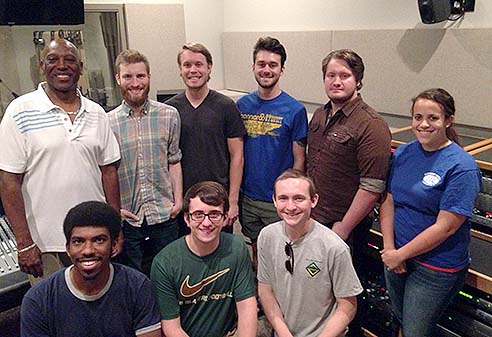 Pictured in front are Jevon Coleman, Jay Freeman and Drew Romanoski. Behind them are Henry Panion, Tommy Bowen, David Smith, Zach Walker, Seth Cain and Julie Mari.
Pictured in front are Jevon Coleman, Jay Freeman and Drew Romanoski. Behind them are Henry Panion, Tommy Bowen, David Smith, Zach Walker, Seth Cain and Julie Mari.
Eight music technology students at the University of Alabama at Birmingham have successfully passed the AVID Pro Tools certification exam.
While many students successfully complete the music technology program in the UAB College of Arts and Sciences Department of Music, only a select few also complete the AVID certification training, and even fewer attain certification, says University Professor Henry Panion III, Ph.D. Panion is co-director of the music technology program with Associate Professor Scott Phillips, Ph.D.
Students prepare for the AVID Pro Tools certification exam through the curriculum offered in the music technology program, including the courses Computer Music I-III, Recording Technology I and II, and Multimedia Production, as well as the Computer Music Ensemble. The certification exam is administered by AVID.
The AVID-certified students are seniors Jevon Coleman of Mobile, Jay Freeman of Moody, David Smith of Pelham, Zach Walker of Madison and Seth Cain of Homewood; junior Drew Romanoski of Helena; and Tommy Bowen of Birmingham and Julie Mari of Corner, who graduated from UAB this spring.
These students join an elite group of UAB music technology majors to achieve this prestigious industry certification in the three years since UAB has been part of the ALP program.
“It is impossible to hear a major recording or see a Hollywood movie where AVID Pro Tools is not used in the recording and editing of everything from the dialogue and sound effects to the movie soundtrack,” Panion said. “Certification is a designation that industry professionals seek when looking for future interns and employees, and gives UAB students an advantage out the door. UAB is the only school in the state of Alabama and among a very few in the Southeast designated an AVID Learning Partner with AVID-certified instructors.”
The certification training and examination combine practical skills for recording, editing, mixing and mastering music for various applications, such as film soundtracks, commercial music and live-sound reinforcement, with a theoretical comprehensive written exam for which the highest level of mastery must be achieved. This level of training and examination gives assurance to the industry that “certified” users have knowledge of the technology and can better perform at a professional level, Panion says.
UAB has been a leader in the field of music technology education since the establishment of its nationally accredited degree program in 1994. The UAB music technology program offers comprehensive training in recording engineering, computer-based music composition and multimedia production.